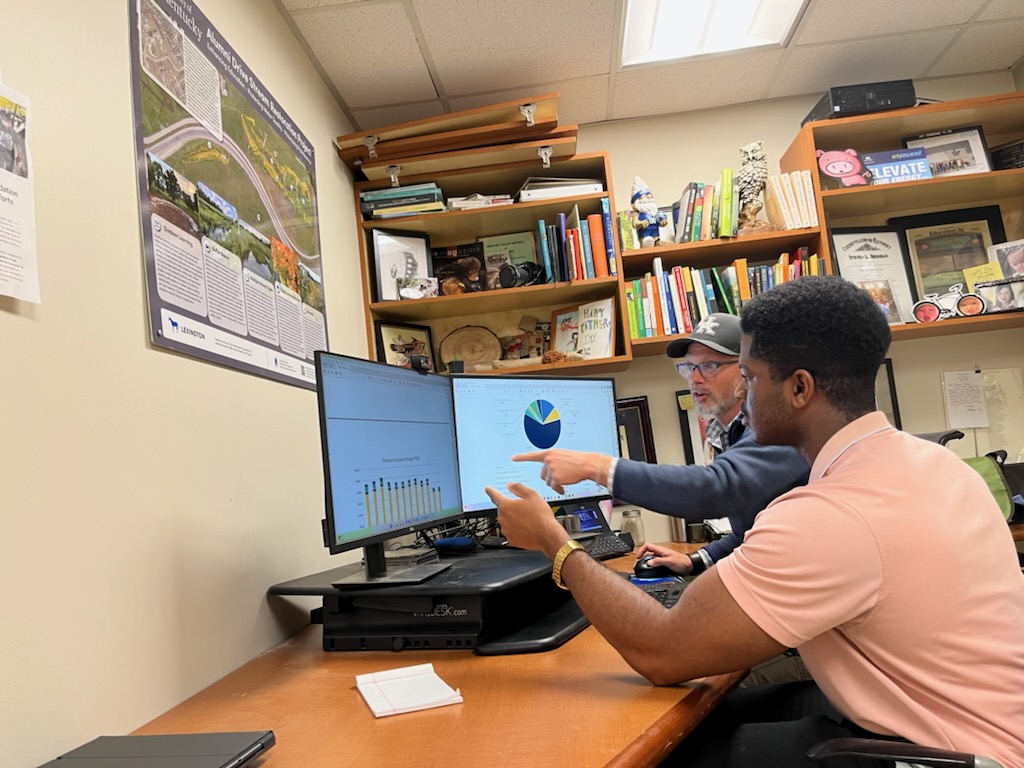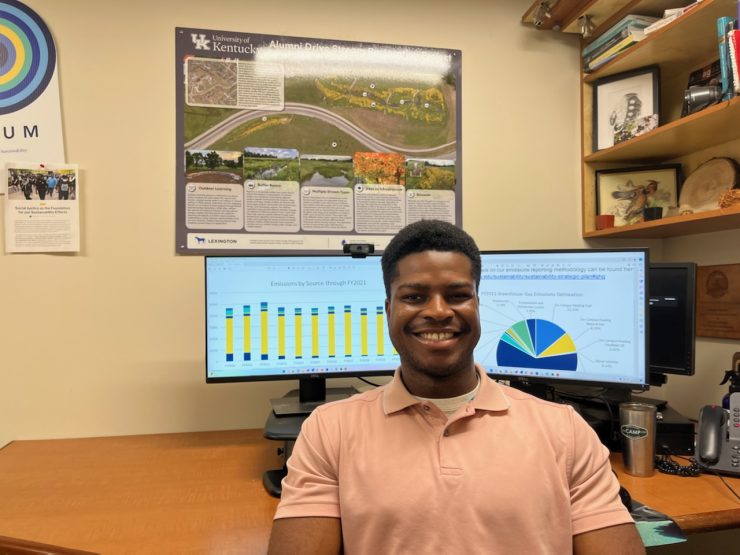In this article, I conduct an interview with doctorate student, Jesse Okorafor, who also plays an active role in sustainability on UK’s campus. I spoke with Jesse about his background in energy conservation, his involvement with the University of Kentucky’s Sustainability Strategic Plan, and his future plans for his career. He also shared a few words of advice for students interested in pursuing a future career while at UK.
Tell me about yourself and your background at the University of Kentucky
My name is Jesse Okorafor and I’m from Lagos in Nigeria. I came here to the University of Kentucky in 2017 to get an undergraduate degree in mechanical engineering. I graduated in 2021 with my mechanical engineering degree and right now I’m pursuing my doctorate. I’m still a doctorate student; I’m not a candidate yet.
How did you get started working in sustainability on UK’s campus?
I have always been passionate about energy. Due to current geopolitical events, I became particularly interested in research focused on energy conservation and efficiency. My professor conducts research focused on carbon capture and greenhouse emissions reduction. To increase my knowledge and give me a better understanding of industrial applications, I began looking for temporary industrial opportunities. I discovered the University has an engineering department and a sustainability department dedicated to the energy requirements of the entire university. I sent them an email; told them I was interested in working for them and got my foot in the door.
You were also a part of the Energy Club. Can you tell me about that experience?
The University of Kentucky Energy Club has the same focal points: energy conservation, energy efficiency, and emissions reduction. Some of the projects we worked on while I was a member were the Powerbike (a rudimentary exercise bike made of cost-effective materials that could be installed around campus. It could also charge electronic devices), and the Hydroelectric Turbine (a prototype turbine built to demonstrate the principles of thermodynamics). These projects allowed me and other students to apply our theoretical knowledge to hands-on problems. Unknowingly, I was preparing myself for grad school and preparing myself for this position, too.
How did you begin working with the Decarbonization Guiding Principle Task Force this summer?
I was working with Britney Ragland (shoutout Britney!) for the Utilities and Engineering Management (UEM) department as an energy engineering intern. UEM is primarily focused on the HVAC and electricity systems of the university. Sometime during the summer, Brittany invited me to the UK Decarbonization Guiding Principles Task Force. The team was there to analyze the University’s decarbonization efforts over the years and begin developing a roadmap for the University’s future efforts. I was on the call simply to listen and learn, but I became more involved because I wanted to leave tangible results that improved the University.
How did you begin the task of creating the reports on the carbon neutrality of campus operations?
The Decarbonization task force wanted to have an idea of how far the University has come since they decided to focus on emissions reduction several years ago in 2009. Since then, they’ve been recording data from various sources of emissions across campus. They had all this data, but they didn’t have an understanding of how to organize it to understand how the University has improved over time. I volunteered to try and see if I could rearrange the data and create the reports. They gave me access to the data and I went from there.

How do you foresee these reports being used by the University as they move forward with the new Sustainability Strategic Plan?
There’s a saying- you can’t know where you are until you look at where you’ve been. You can’t be sure of your current standing if you don’t look at the steps you’ve taken along the way. From my understanding, in 2009, there was no data on the University’s emissions. The University had no idea how well it was doing in reducing emissions. With the data being visualized and published now, it allows the University to set realistic goals for itself and see how significant some emissions are, such as HVAC. It helps the University see where exactly it should focus its emissions reduction efforts, and how to set tangible goals that can be met over the next ten years. I believe this will put the University at the forefront of emission reduction efforts compared to other campuses throughout the U.S. It’s becoming more prevalent even globally, and we’re seeing more and more countries concentrating efforts on emissions reductions. It shows how forward-thinking UK is, trying to be ahead of the curve.
Was there anything specific that stood out in your findings as you worked with the data?
I don’t think people realize how significant heating and cooling are, I think that was the biggest thing. Electricity and HVAC make up a huge percentage of emissions for the campus, and I’m sure it’s the same way for many colleges around the country. The University is just a miniature city within a bigger city. I think we need to look for more efficient ways of heating and cooling. Maybe we need to be more conscious of the way we use our air conditioning and thermostat, especially with respect to the temperature outside. It was really surprising how much those things played a part in the campus’s emissions.
How do you see yourself utilizing the knowledge and experience you’ve gained during your time here as a student and intern?
I appreciate this opportunity because it gave me insight into what goes into operations like HVAC. I discovered that boilers that are used in HVAC are also used in power generation. Long term, I would like to work with power generation and explore sustainability in power generation. I see this opportunity as a stepping stone, but I also see myself continuing to work alongside the team I met this summer and helping them in any way I can because of the wealth of knowledge and experience that I have gained that cannot be bought.
Before we wrap up, is there anything else you would like to add?
I would say to anyone reading this, if there’s any opportunity you’re looking for, even if there’s no official application or it doesn’t seem like the opportunity exists, it can be created. Send an email, speak to someone, and if you want to do something, try to find a way. The University has everything for everyone. I don’t think there’s any major that the University itself does not provide opportunities for you to practice that major. These opportunities give you valuable experience and networking opportunities while improving your knowledge and broadening your skills.
Originally published December 6th, 2022

You could be the next student interviewed by WholeSum! If you are doing exciting work behind the scenes for sustainability at UK, click HERE to tell us about it and start the conversation!



























